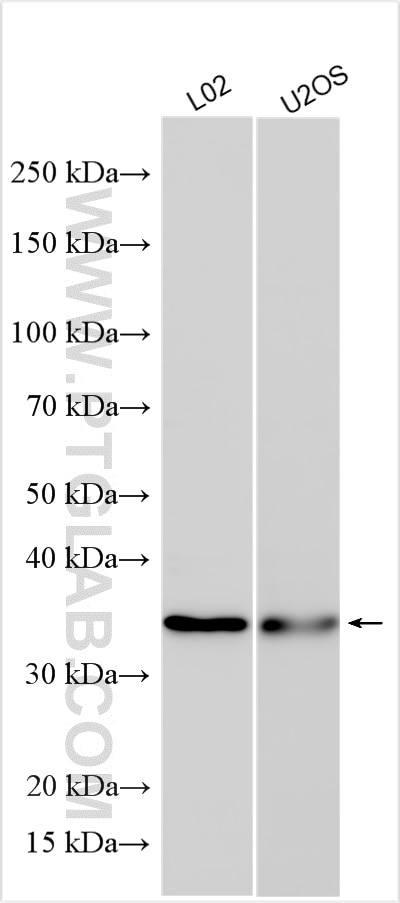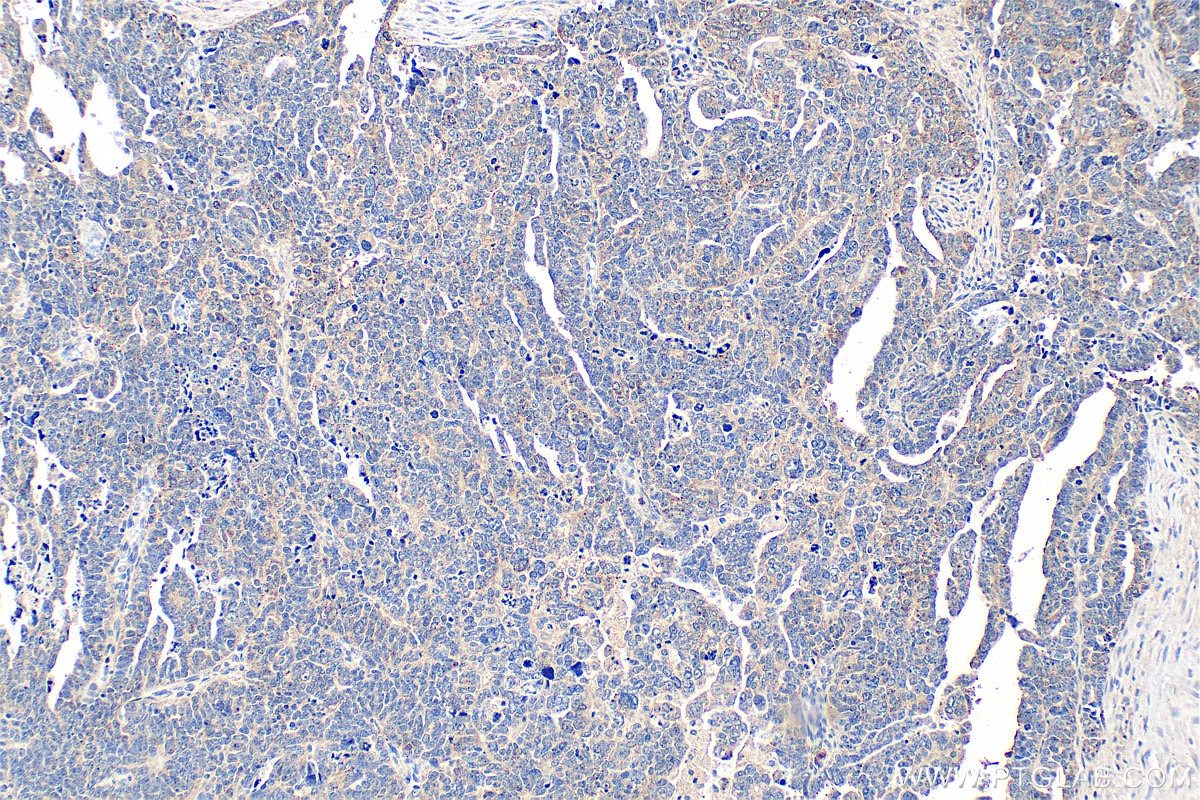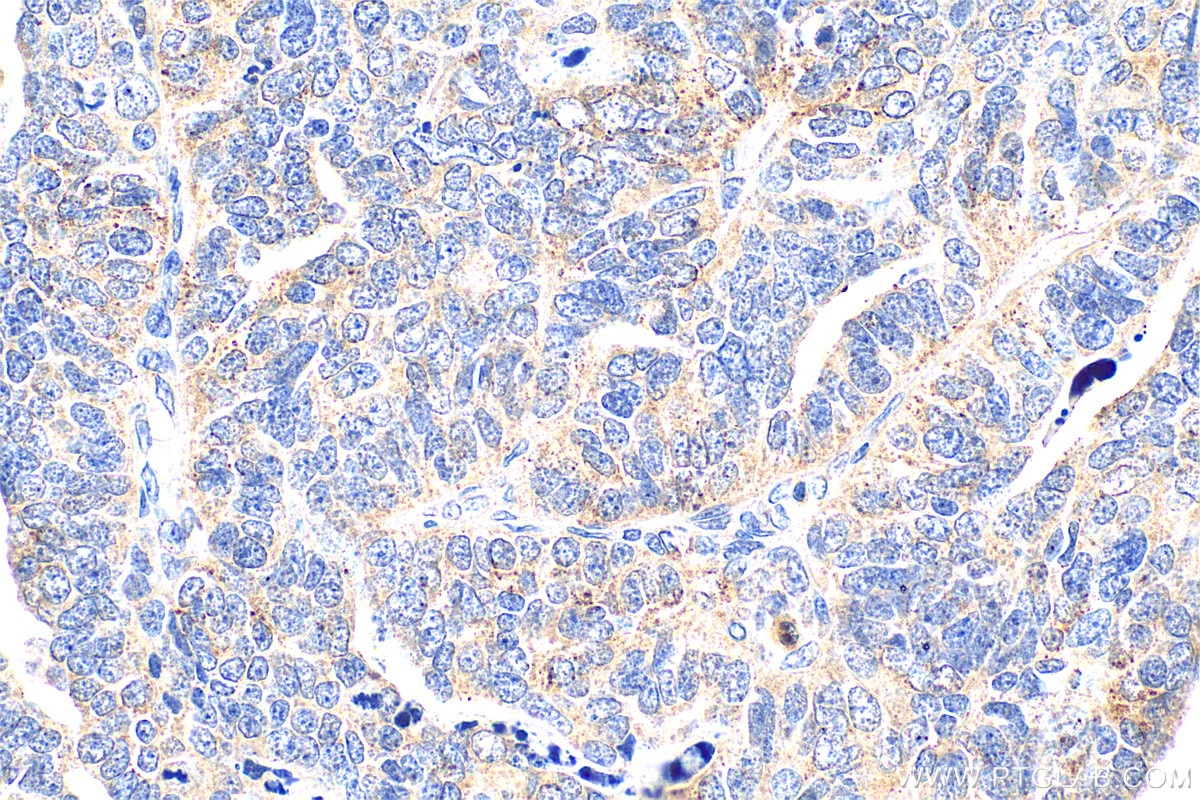- Featured Product
- KD/KO Validated
PMEPA1 Polyklonaler Antikörper
PMEPA1 Polyklonal Antikörper für WB, IHC, ELISA
Wirt / Isotyp
Kaninchen / IgG
Getestete Reaktivität
human, Maus, Ratte
Anwendung
WB, IHC, IF, ELISA
Konjugation
Unkonjugiert
Kat-Nr. : 16521-1-AP
Synonyme
Geprüfte Anwendungen
| Erfolgreiche Detektion in WB | L02-Zellen, U2OS-Zellen |
| Erfolgreiche Detektion in IHC | humanes Ovarialkarzinomgewebe Hinweis: Antigendemaskierung mit TE-Puffer pH 9,0 empfohlen. (*) Wahlweise kann die Antigendemaskierung auch mit Citratpuffer pH 6,0 erfolgen. |
Empfohlene Verdünnung
| Anwendung | Verdünnung |
|---|---|
| Western Blot (WB) | WB : 1:500-1:2000 |
| Immunhistochemie (IHC) | IHC : 1:200-1:800 |
| It is recommended that this reagent should be titrated in each testing system to obtain optimal results. | |
| Sample-dependent, check data in validation data gallery | |
Veröffentlichte Anwendungen
| KD/KO | See 4 publications below |
| WB | See 8 publications below |
| IHC | See 3 publications below |
| IF | See 2 publications below |
Produktinformation
16521-1-AP bindet in WB, IHC, IF, ELISA PMEPA1 und zeigt Reaktivität mit human, Maus, Ratten
| Getestete Reaktivität | human, Maus, Ratte |
| In Publikationen genannte Reaktivität | human, Maus |
| Wirt / Isotyp | Kaninchen / IgG |
| Klonalität | Polyklonal |
| Typ | Antikörper |
| Immunogen | PMEPA1 fusion protein Ag9744 |
| Vollständiger Name | prostate transmembrane protein, androgen induced 1 |
| Berechnetes Molekulargewicht | 287 aa, 32 kDa |
| Beobachtetes Molekulargewicht | 32-36 kDa |
| GenBank-Zugangsnummer | BC015918 |
| Gene symbol | PMEPA1 |
| Gene ID (NCBI) | 56937 |
| Konjugation | Unkonjugiert |
| Form | Liquid |
| Reinigungsmethode | Antigen-Affinitätsreinigung |
| Lagerungspuffer | PBS with 0.02% sodium azide and 50% glycerol |
| Lagerungsbedingungen | Bei -20°C lagern. Nach dem Versand ein Jahr lang stabil Aliquotieren ist bei -20oC Lagerung nicht notwendig. 20ul Größen enthalten 0,1% BSA. |
Hintergrundinformationen
PMEPA1, also known as TMEPAI, was first discovered as androgen inducible gene in hormone responsive LNCaP cells. PMEPA1 is highly expressed in various solid tumors and is known to play important roles in the transforming growth factor-β(TGF-β) signaling pathway (PMID: 27697531).
Protokolle
| PRODUKTSPEZIFISCHE PROTOKOLLE | |
|---|---|
| WB protocol for PMEPA1 antibody 16521-1-AP | Protokoll herunterladen |
| IHC protocol for PMEPA1 antibody 16521-1-AP | Protokoll herunterladenl |
| STANDARD-PROTOKOLLE | |
|---|---|
| Klicken Sie hier, um unsere Standardprotokolle anzuzeigen |
Publikationen
| Species | Application | Title |
|---|---|---|
EMBO Mol Med An autocrine ActivinB mechanism drives TGFβ/Activin signaling in Group 3 medulloblastoma. | ||
Int J Biol Sci METTL16 suppressed the proliferation and cisplatin-chemoresistance of bladder cancer by degrading PMEPA1 mRNA in a m6A manner through autophagy pathway | ||
Front Immunol PMEPA1 Is a Prognostic Biomarker That Correlates With Cell Malignancy and the Tumor Microenvironment in Bladder Cancer
| ||
FASEB J PMEPA1 and NEDD4 control the proton production of osteoclasts by regulating vesicular trafficking.
| ||
J Virol NF-κB-Interacting Long Noncoding RNA Regulates HIV-1 Replication and Latency by Repressing NF-κB Signaling. | ||
Biochem Biophys Res Commun PMEPA1, a TGF-β- and hypoxia-inducible gene that participates in hypoxic gene expression networks in solid tumors.
|




